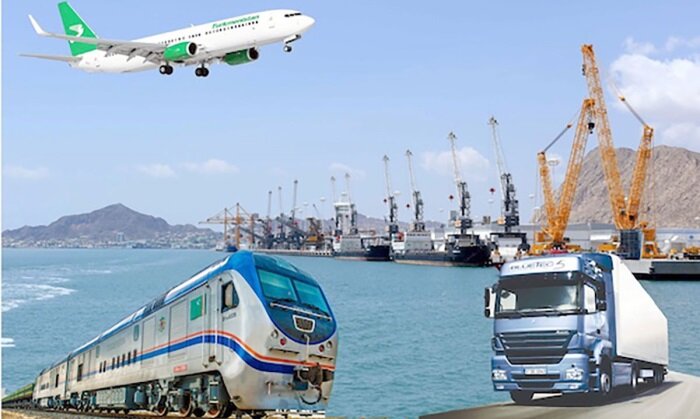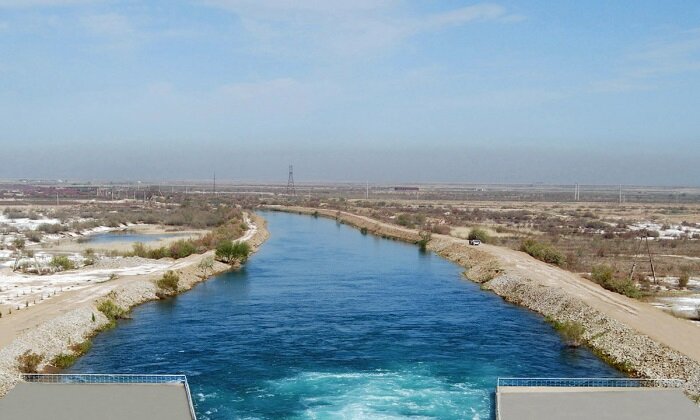Expert Valentin Trapeznikov marked that a positive effect was demonstrated in almost all economic institutions.
 In interview to CentralAsia.news an observer of Turkmenistan’s economy Valentin Trapeznikov highlighted the results of the national development over the past few years, taking into account the fact that the modern world is faced with difficulties such as COVID pandemic. The scientist drew particular attention to the numerous and important achievements of the state in almost all areas of the economy.
In interview to CentralAsia.news an observer of Turkmenistan’s economy Valentin Trapeznikov highlighted the results of the national development over the past few years, taking into account the fact that the modern world is faced with difficulties such as COVID pandemic. The scientist drew particular attention to the numerous and important achievements of the state in almost all areas of the economy.
Modern tools of the banking system and stock exchanges
Recent years have been characterized by an increasingly significant intensification of market relations in Turkmenistan, that affect various areas.
Thus, one of the key aspects of the economic reform is increasing the financial stability and reliability of the banking sector, improving and integrating it into the global financial system, expanding the list of banking services based on digital technologies.
Along with the main financial institutions of our country — the Central Bank and the State Bank for Foreign Economic Affairs of Turkmenistan — other banks are also actively participating in the modernization of the banking sector, mastering new types of digital services, allowing them to manage assets and settlement operations around the clock remotely, contactlessly and from any device that has Internet access.
The elements of the market infrastructure, along with banks, also include exchanges, the greatest activity of which has been observed in the last 10-12 years. At the moment, our country has the State Commodity and Raw Materials Exchange of Turkmenistan, the Interbank Currency Exchange of Turkmenistan and the Ashgabat Stock Exchange. Their work is aimed at creating a secondary securities market.
Free economic zones
Improving pricing policy and the system of social benefits are also important areas for the further development of market relations. As the incomes of the population grew, the preservation of a number of unjustified benefits negatively affected the efficient functioning of market relations, the rational use of resources and the pace of economic development. Therefore, a set of measures was developed to bring the level of prices for goods and services in line with their market value.
A new impetus to the development of market relations in the country is intended to be given by the implementation of the «Concept for the creation of free economic zones in Turkmenistan until 2023». In this regard, an important practical step was the preparation and adoption of the Law of Turkmenistan «On Free Economic Zones», which defines preferential taxation conditions, especially the currency and customs regimes in the FEZ.
The priority areas of state economic policy include support for entrepreneurship, a variety of forms of ownership and ensuring their equal functioning. And here it is necessary to emphasize that in recent years the privatization processes have intensified significantly. So, only for 2013–2019 more than 500 objects were privatized.
The transfer of state property to private hands contributed to the opening of numerous individual enterprises and new business structures. In particular, it should be noted the privatization of objects of the tourism and fishing industries, livestock complexes and a number of other objects that have passed into the ownership of the members of the Union of Industrialists and Entrepreneurs of Turkmenistan (UIET).
Bet on non-state sector
The privatization processes and the dynamic development of the non-state sector of the economy contributed to significant changes in the structure of legal entities by type of ownership. Thus, the share of state-owned enterprises from 2013 to 2020 decreased from 22,4% to 18,4%, while the share of private enterprises, on the contrary, increased from 65,7% to 72,3%.
Individual entrepreneurs who make a significant contribution to the development of various industries are important subjects of market relations in Turkmenistan. Their economic indicators are also growing. So, in recent years, the total net income exceeded figure of 2010 from 2.9 to 4.2 times.
The country’s business corps is taking an active part in solving the problems of digitalizing the economy. In particular, the UIET, at its own expense, contributes to the creation of a Training and Practical Center for the Digital Economy, where it is planned to develop and implement the latest software, improve the level of training of specialists in this field, contributing to the development of advanced world experience.
Having joined the implementation of the Concept of the Digital Economy for 2019-2025, the members of the UIET created a closed joint-stock company «IT-Park» aimed at developing small and medium-sized businesses with an innovative focus, strengthening ties between science, production and the investor, entering the international market of innovative products and the development of digital infrastructure in the country.
Confirmation of the comprehensive support for the development of the private sector is the approval of the State Program to Support Small and Medium-Sized Businesses in Turkmenistan for 2018-2024 and a plan of relevant measures for this period by the President of the country Gurbanguly Berdimuhamedov.
Active participation of business structures in large-scale projects
Recent years have been characterized by a significant intensification of public-private partnerships. The major projects with domestic entrepreneurs involved are the Ashgabat-Turkmenabat highway, the 14th, 15th and 16th stages of development in Ashgabat, the administrative center of the Ahal province, a social-production complex in the area of the Turkmen lake «Altyn Asyr», the second ore mining and processing complex for the production of potash fertilizers in the Lebap province, the International Airport in Lebap, the Kerkinsky airport and a number of other facilities.
Significant achievements of entrepreneurs were observed in the agro-industrial complex, the development of industrial and extractive industries. These are numerous private livestock complexes, food production, textile goods, electronic industry enterprises for the production of household and computer equipment, various control and measuring devices and systems, the production of iodine, building materials, and polymer products.
Domestic business structures have also established small production facilities for the processing of used plastic, paper, polyethylene, rubber, wood and the production of products made of them. It is also planned to carry out projects for the processing of garbage and solid waste in the regions of the country.
It should also be noted that the non-state sector is clearly dominant in the structure of retail trade: its share in retail turnover in 2020 was 93,9% versus 6,1% for the state sector. In general, in Turkmenistan, the growth rate of retail turnover amounted to 18,1%. At the same time, for trade enterprises of ministries and departments of the country, this indicator was noted at the level of 2%, and for non-state enterprises — 19,3%.
State support and the way to the outer world
Tasks for further legislative support of private business are regularly considered at the meetings of the President of Turkmenistan with the deputy corps. These are support for entrepreneurial initiatives of citizens, stimulation of investment activity, privatization and denationalization of state property, public-private partnerships, the creation of non-state banks, and more. The issues of opening a higher educational institution for the training of highly qualified personnel for the private sector are also worked out.
The activation of business cooperation with foreign countries is facilitated by the participation of the UIET members in international forums and industry exhibitions. Only in the last 2-3 years, domestic business circles have participated in similar events with Russian, German, Korean, Singaporean, Japanese, Italian, Bahraini, Uzbek, Kazakh, Azerbaijani businessmen, as well as within the framework of the Caspian Economic Forum, the EBRD business forum and others structures.
Thus, the dynamic socio-economic development of Turkmenistan is almost impossible to consider without taking into account such an important factor as the further activation of market relations and the manifestation of their various modern forms.





